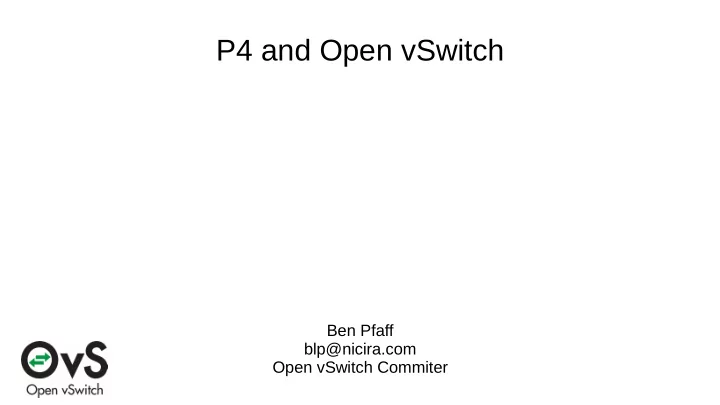

P4 and Open vSwitch Ben Pfaff blp@nicira.com Open vSwitch Commiter
Open vSwitch Architecture ... VM 1 VM 2 VM n VMs Netlink Hypervisor OVSDB kernel module ovsdb-server ovs-vswitchd user kernel OpenFlow OVSDB NICs Controller
Where is Open vSwitch Used? ● Broad support: – Linux, FreeBSD, NetBSD, Windows, ESX – KVM, Xen, Docker, VirtualBox, Hyper-V, … – OpenStack, CloudStack, OpenNebula, (OVN!), … ● Widely used: – Most popular OpenStack networking backend – Default network stack in XenServer – 1,440 hits in Google Scholar – Thousands of subscribers to OVS mailing lists
The Big Picture ● Most releases of OVS add support for new fields or protocols. ● Every new field or protocol requires changes throughout OVS. ● Every change to OVS requires building, distributing, and installing a new version of OVS. ● Every field needs coordination with controller authors (+ONF). ● (Sometimes reasonable people disagree about a field, too!) ● It would be great to avoid all of this!
The Big Vision Requirements ● Reconfigure protocols and fields without recompiling ● Maintain or boost performance ● Maintain OVS backward compatibility ● Maintain (and extend) OpenFlow compatibility Nice-to-Have ● Minimize dependencies. ● Support both OVS software datapaths (kernel and user/DPDK). ● Avoid making OVS modal. ● Define “legacy” features in terms of new interface ● Avoid fragmenting P4 spec.
The Easy Part ● Define OVS fields and protocols with P4 header_type , header , parser s (~300 lines of P4 for everything in OVS). ● Map these fields and protocols to OpenFlow “OXM” matches – by naming (e.g. name your eth_dst field OXM_8000_03) – with an external mapping table – with special comments in the P4 source code – by defining OXM matches as metadata and storing into them
The Harder Part: OVS Linux datapath ● How do we make openvswitch.ko extensible? ● Probably not acceptable to support P4 directly in kernel. ● Kernel already has an extensibility mechanism, eBPF: 64-bit hardware-like virtual machine. – Extended form of BPF (used e.g. for tcpdump). – Safe for untrusted user code via verifier. – JIT for high performance on popular archs (e.g. x86, ARM). – ● eBPF is a suitable compiler target for P4! (Size could be an issue: 1415/4096.) ● (User/DPDK datapath can use any approach we like.)
Unsolved Conceptual Issues in P4-OVS Binding ● Weird fields – Transforming P4 to OpenFlow is not too hard – Transforming back from OpenFlow to P4 might need help – e.g. OVS treats CFI bit in VLANs as “present” bit ● Inserting and removing fields – VLAN and other encapsulation push/pop – MPLS requires reparse after pop
The Prototype ● P4 syntax lexer (complete language) ● P4 syntax parser ( header_type , header , parser ) ● ovs.p4: P4 for OVS supported protocols and fields (minus IPv6) ● Compiler that accepts P4 and emits eBPF (just what ovs.p4 needs) ● eBPF interpreter for OVS userspace (would be replaced by JIT for production use) – ● Replacement flow parsing routine that invokes eBPF ● Total: 5,500 new lines of code written over about 1 week
The Worst Part of the Prototype: Mapping P4 to OpenFlow via metadata OVS flow definition P4 metadata definition P4 parser mapping struct flow { header_type flow_t { header_type flow_t flow; parser eth { ... fields { extract(l2_eth); … … set_metadata(flow.eth_src, uint8_t eth_src[6]; eth_src : 48; l2_eth.eth_src); uint8_t eth_dst[6]; eth_dst : 48; set_metadata(flow.eth_dst, ovs_be16 eth_type; eth_type : 16; l2_eth.eth_dst); … … ...
Future Work ● Most important: solve unresolved questions in P4-OVS and P4- OpenFlow bindings ● P4 to eBPF compiler refinement (needs optimizer; use LLVM?) ● Lots of code to crank out.
Questions? Source code: https://github.com/blp/ovs-reviews/releases/tag/p4-workshop
P4-to-eBPF Example P4 BPF header_type l2_eth_t { # r5 = current(0,16) # set_metadata(flow.dl_dst) fields { # r5 = l2_eth.eth_dst 27: ld #0, r5 eth_dst : 48; 1: ld #0, r5 eth_src : 48; 29: ldh 0xc[r5], r5 } 3: ldd [r5], r5 30: if (r5 != #0x8100) jmp 32 } 4: rshd #0x10, r5 header l2_eth_t l2_eth; 31: jmp 33 5: lshd #0x10, r5 parser l2_eth { 32: jmp 744 extract(l2_eth); 6: ld #0x10068, r6 set_metadata(flow.dl_dst, latest.eth_dst); 8: ldd [r6], r7 set_metadata(flow.dl_src, latest.eth_src); 9: ld #0xffff, r8 return select(current(0, 16)) { 0x8100: l2_vlan; 11: andd r7, r8 default: l2_ethertype; 12: ord r5, r7 } 13: std r7, [r6] } ...
Recommend
More recommend